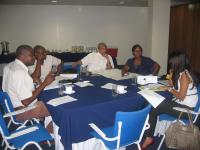
As a high level meeting on South-South Cooperation and Capacity Development approaches, there is a growing push to get from talking to walking.
Some 300 participants are expected to gather in Bogota, Colombia from the 24-26 March, for an intermediate international meeting to discuss and agree on policy recommendations ahead of a 2011 High Level Forum on aid effectiveness in South Korea.
Capacity Development (CD) is strongly embedded in the agenda of the South. It is an ambitious and challenging agenda that aims to harness broad political leadership, get beyond fragmented and piecemeal approaches, address systemic issues related to state reform and incentives, and make increased use of South-South co-operation and regional/local resources.
To deliver on this agenda, CD champions from the South and the North now have to get beyond the level of intentions and turn to action, both jointly and individually.
This was the broad consensus emerging from the meeting hosted by the CD Alliance and the OECD/DAC in late 2009, attended by Southern champions and donor representatives. The OECD/DAC capacity development unit has produced an Issues Brief that summarises the outcomes of the meeting.
While there appears to be a broad consensus on Southern and Northern perspectives of what CD entails, there is a considerable gap between theory and practice. The OECD/DAC hosted meeting identified the following entry points to move towards better practice:
Develop capacity to support capacity development - a joint agenda: Both development partners and partner countries need to increase their ability to work with capacity issues and capacity development. This includes addressing the incentive issues – on both sides. It also includes getting ambitions and priorities right – not the least in “fragile” settings where a supply- and donor-driven agenda may easily do harm by diverting scarce local capacity to donor activities.
Don’t start from scratch: A Southern perspective on capacity development reminds external actors that there is always something to build on. Progress can be made, even if modest, and experiences and lessons learnt can highlight both what seems to work and what definitely does not.
Untie CD support: Development partners should, until they can provide support for CD through country systems, untie their CD support and revise their procedures so that countries can get the requisite co-operation and support locally, regionally, or from other southern sources when this provides the best value for money.
Get evidence and learn from it: There is a rich array of material already available. However, this information seems to circulate narrowly and country and development partners need to integrate joint, evidence based learning into their collaboration at the sector, thematic and local level. The issue of incentives, linked to broader civil service reforms, seems a particularly important topic.
Take CD to the political level: To bridge the gap between the theory of CD and practice at country, sector and local level, champions on both sides need to mainstream capacity on the political agendas in their respective systems. This demands convincing stories and clear messages confirming that a Southern perspective on capacity development is workable and practical.
The outcomes of CD Alliance- and OECD/DAC-hosted meeting are now feeding into the preparations for Bogota, which we will continue to follow on www.capacity4dev.eu.
Log in with your EU Login account to post or comment on the platform.